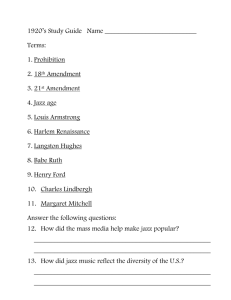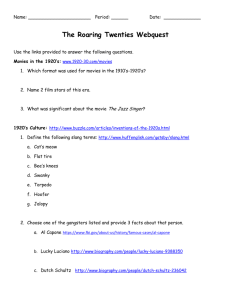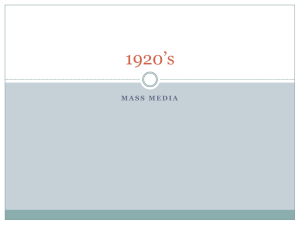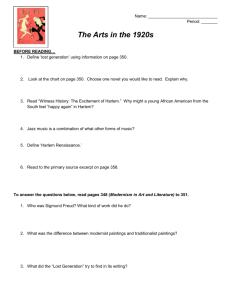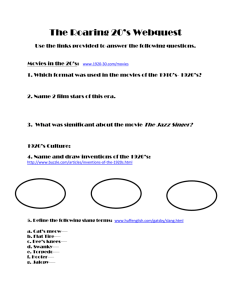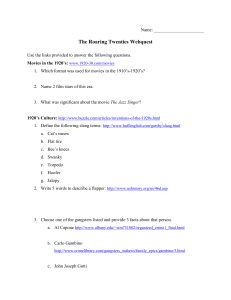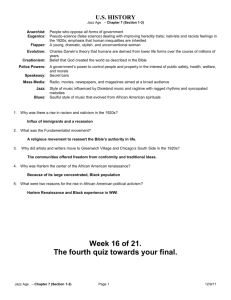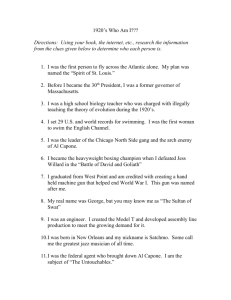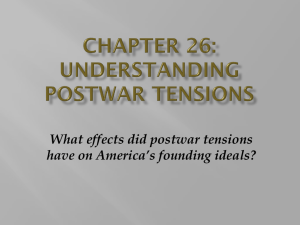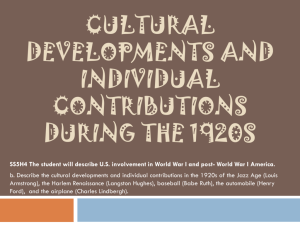PPT
advertisement
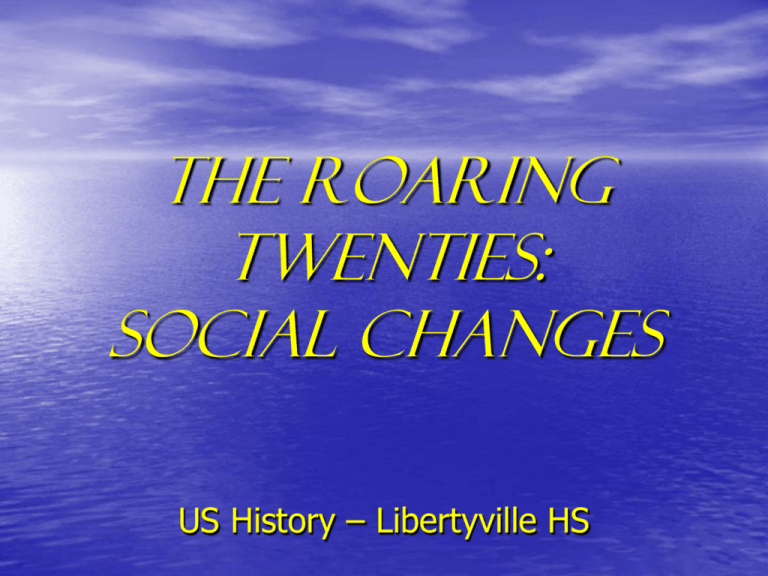
The Roaring Twenties: Social Changes US History – Libertyville HS Industrial & Consumption Changes • Electricity: greater • availability, productivity Business Management – Frederick Taylor’s “Efficiency Engineering” (scientific methods, selection of workers, training) – “Cost accounting” (budgeting) – Greater standardization – Product advertising – Growth of retail stores – Installment buying Industrial, Consumption Changes • Household appliances • Food shipment & storage – Refrigerators & refrigerated RR cars – Frozen foods – Cellophane • Automobiles – 1920: million – 1930: million 8 million cars, 1 trucks 23 million cars, 3.5 trucks Social Changes • Greater socio-economic mobility – Move to suburbs – Better jobs – Demand for entertainment • Changing values: heroes – Pre 1920: heroes were political, economic figures – Post 1920: heroes were sports, entertainment stars Changing Values • Sports – Jack Dempsey (boxing) – Red Grange “The Galloping Ghost” (football) – Babe Ruth “The Sultan of Swat” (Baseball) – Bobby Jones (Golf) • Radio Stars – Bing Crosby – Rudy Vallee Changing Values • Movie Stars – Charlie Chaplin “The Little Tramp” – Buster Keaton – Rudolph Valentino (the kiss) – Clark Gable – Louise Brooks – Clara Bow “the It Girl” – Al Jolson “The Jazz Singer” (1927) – Cecile B. de Mille The Music Scene • Music: The age of Jazz – Jazz: combine African rhythms with European harmonies – Jelly Roll Morton – jazz pioneer – Louis Armstrong “Satchmo” – Duke Ellington – George Gershwin – Aaron Copland (folk themed orchestral music) – “The Blues”: distinctly A-A cultural music, based in spirituals, work songs, hollers BONUS: Stephen Foster (1826-1864) Feats & Fads • Airplane feats – Charles Lindbergh • “Spirit of St. Louis” – Amelia Earhart – Billy Mitchell • Fads – – – – Charleston Marathon dances Flappers Flagpole sitting Literature • 1920s trends – Rejection of American justice – Rejection of American small town life – Rejection of American materialism – Desire for “lasting” values • Notable authors – H.L. Mencken: elitist; Scopes – Sinclair Lewis: 1st Nobel Prize Literature • Giants of the Field – F. Scott Fitzgerald • “The Great Gatsby” • “Tender is the Night” • Emphasized the impact of wealth, success – Ernest Hemingway • “The Sun Also Rises” • “A Farewell to Arms” • Preoccupation with death & the “lost” generation (WWI) – William Faulkner • “The Sound and the Fury” • Satirized the south African American Literature • W.E.B. Dubois – A-A intellectual selfawareness • “The Harlem Renaissance” – Claude McKay – “A Long Way from Home” – Langston Hughes • “Harlem” • “Not Without Laughter” – All were commentaries on the black experience, in America “Harlem” by Langston Hughes What happens to a dream deferred? Does it dry up like a raisin in the sun? Or fester like a sore— And then run? Does it stink like rotten meat? Or crust and sugar over— like a syrupy sweet? Maybe it just sags like a heavy load. Or does it explode? Theater & Poetry • Eugene O’Neill – Nobel Prize for Drama; Pulitzer’s Prize • Helen Hayes “First “I bet you if I had met him and had a chat with him, I would have found him a very interesting and human fellow, for I never in all of them yet met a man that I didn’t like. When you meet people, no matter what opinion you might have formed about them beforehand, why, after you meet them and see their angle and their personality, why, you can see a lot of good.” Will Rogers • • Lady of the American Stage” Will Rogers (satirist) T.S. Eliot – The Wasteland – Disillusionment of life
